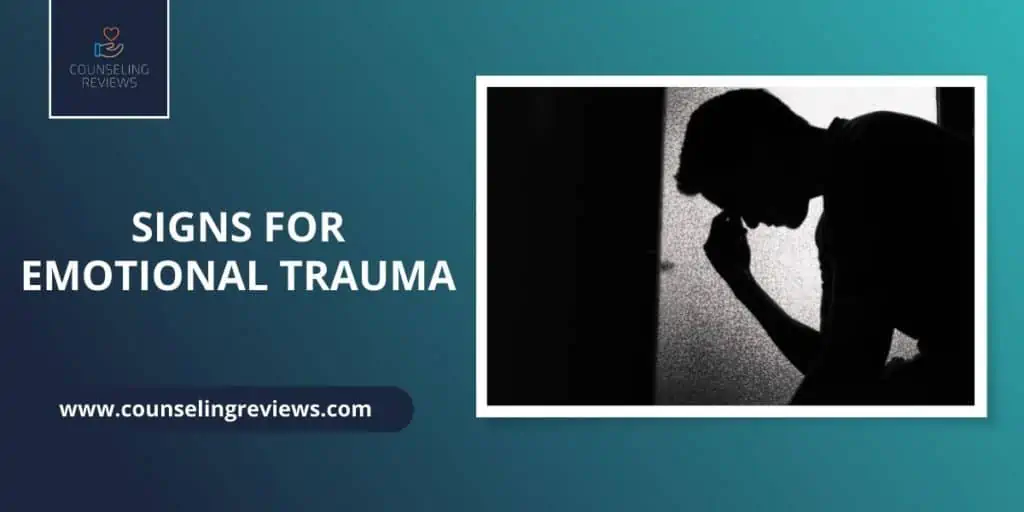Many people experience emotional trauma some time in their lives. To properly heal from the event, it is important to deal with the trauma. When left unaddressed, a person may suffer from other serious mental health and physical issues. Recognising you have a problem is the first step on your healing journey.
Definition of Emotional Trauma
In order to know whether you or a family member is experiencing emotional trauma, you must understand what emotional trauma is. Emotional trauma is when a person’s sense of security is damaged due to a highly stressful event, also known as a traumatic event. The emotions, anxiety, and memories surrounding the event may make you feel helpless and distrust others.
Emotional traumas can be a result of:
- A one-time event such as a life-threatening event or a natural disaster
- Relentless stress such as bullying
- Other life-altering causes such as major surgery or death of a loved one
Signs of Emotional Trauma (physical, emotional, phycological)
Emotional trauma manifests itself in many ways throughout your body and mind. It is essential to understand that when you experience emotional trauma, there is no right or wrong way to react. However, there are some common reactions that a person may experience.
Emotional, psychological, and physical signs of trauma include:
- Personality changes
- Agitation
- Withdrawing from others
- Poor self-care
- Hopelessness
Does Emotional Trauma Differ from PTSD? If so, How?
Emotional trauma and PTSD (post-traumatic stress disorder) are closely linked. With emotional trauma, the symptoms you experience decrease over time. They may still crop up when you are reminded of the event, but you can cope with the trigger. When the symptoms don’t fade, you may be experiencing post-traumatic stress disorder. This is a long-term emotional response because your nervous system remains in a state of shock and cannot move on from the event.
Signs of PTSD include:
- Flashbacks to the trauma
- Extreme physical reactions to reminders of the trauma
- Loss of interest in daily activities
- Feeling detached from others
- Sensitivity to things relating to the trauma
How Does the Body Cope with Trauma?
Emotional traumas are not just experienced in mind. Your body reacts to the overt stress in a variety of ways. While the event is taking place, your body often goes into a ‘fight or flight’ response. This is the body’s way of protecting itself. Afterward, your body can still experience symptoms from the upsetting event.
Some physical symptoms of trauma include:
- Increased heart rate
- Fatigue
- Insomnia
- Aches and pains
- Muscle tension
- Being easily startled
- Nightmares
How to Cope During Quarantine?
While the COVID-19 quarantine is in place to keep people safe, it may have negative consequences on a person’s mental health. Isolation and the fear many people are experiencing can have short-term and lasting effects on a person. This may even cause some people to develop PTSD. If your mental health is suffering, try reaching out to friends and family to talk about your feelings. Online counseling for stress or anxiety may also be an excellent choice for you.
How Can Online Therapy Help?
Online counseling is an accessible way for anyone to participate in therapy appointments. This style of counseling allows a person to have therapy sessions from their own home. They also tend to be more cost-effective. It can help you have a safe space to deal with your emotions and any life issues you are experiencing. Some online sites even allow you to participate anonymously, which is helpful if you are feeling self-conscious. Online therapy can be beneficial for various people, including families, teens, kids, LGBTQ, and many others.
Resources
Traumatic experiences can significantly impact your mental health. If left unaddressed, you can begin to experience mental health illnesses such as anxiety and depression. Here are a few suggestions for finding mental health support:
- Join an in-person or online support group
- Seek counseling
- Read books about mental health
- Chat with a family member or someone you trust
Conclusion
Emotional trauma may be experienced by many people, but it still leaves a person feeling abnormal. There is no perfect or quick solution. The journey to recovery takes time, patience, and a lot of work. Through understanding, acceptance, and counseling, you, too, can work towards recovery and a happier self.





